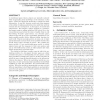281 search results - page 46 / 57 » Planning with Partial Preference Models |
SIGECOM
2006
ACM
14 years 2 months ago
2006
ACM
In traditional game theory, players are typically endowed with exogenously given knowledge of the structure of the game—either full omniscient knowledge or partial but fixed in...
NLE
2008
13 years 8 months ago
2008
We describe SkillSum, a Natural Language Generation (NLG) system that generates a personalised feedback report for someone who has just completed a screening assessment of their b...
WSC
2008
13 years 10 months ago
2008
Simulation modeling has the capability to represent complex real-world systems in details and therefore it is suitable to develop simulation models for generating detailed operati...
IJAOSE
2010
13 years 7 months ago
2010
CASO is an agent-oriented programming language based on AgentSpeak(L), one of the most influential abstract languages based on the BDI (Beliefs-Desires-Intentions) architecture. ...
SIGMETRICS
2011
ACM
12 years 11 months ago
2011
ACM
The workloads in modern Chip-multiprocessors (CMP) are becoming increasingly diversified, creating different resource demands on hardware substrate. It is necessary to allocate h...



